Dubai: Covaxin, made by Bharat Biotech, is seen as a game-changing weapon in the fight against corononavirus. India’s first home-grown COVID-19 shot showed 81% efficacy following Phase 3 clinical trial, Bharat Biotech said on Wednesday (March 3, 2021).
That figure is significant: it marks a key milestone in vaccine development in the subcontinent. Moreover, it removes the cloud over Covaxin. It’s likely that more Indians will follow Prime Minister Narendra Modi’s footsteps in getting a Covaxin shot.
Top officials at Bharat Biotech, based in Hyderabad, said the "interim data” came from an initial read of Phase 3 clinical trials involving 25,800 participants. More importantly, Dr Krishna Ella, Bharat’s Managing Director, said the vaccine also works against new variants of the virus. Bharat Biotech is no stranger to vaccines.
What's the name of Bharat Biotech’s vaccine against SARS-CoV-2?
Covaxin [officially known as BBV152 in scientific circles].
Covaxin’s 80.6% efficacy: What is number based on?
It was based on the initial results of Phase-3 trials. All the other vaccines approved (under the so-called “emergency use authorisation) also derived their efficacy from initial data readouts.
Among the vaccine trial volunteers who contracted the virus after getting Covaxin, 36 out of 43 cases were recorded in the placebo group. There were seven cases among those given shot, pointing to an efficacy rate of 80.6%, the company said. The cases had symptoms ranging from mild to moderate and severe.
When is the next and final analysis?
The next interim analysis will target 87 cases. The final analysis will be based on 130 cases, according to trial document monitored by the WHO. The study is designed to evaluate Covaxin (BBV152) in preventing COVID-19 for up to 1 year after the second dose. The trial used the “gold standard” of drug investigations (double-blind, placebo-controlled, randomised, event-driven, multi-centre study).
What’s the age of Covaxin trial volunteers?
Based on the trials, volunteers were ages 18 through 59, but there were also those who were 60 or older.
How many Covaxin trial participants were older than 60, or with comorbidities?
The Phase-3 trial included 2,433 participants who were older than 60, and 4,500 participants with comorbidities.
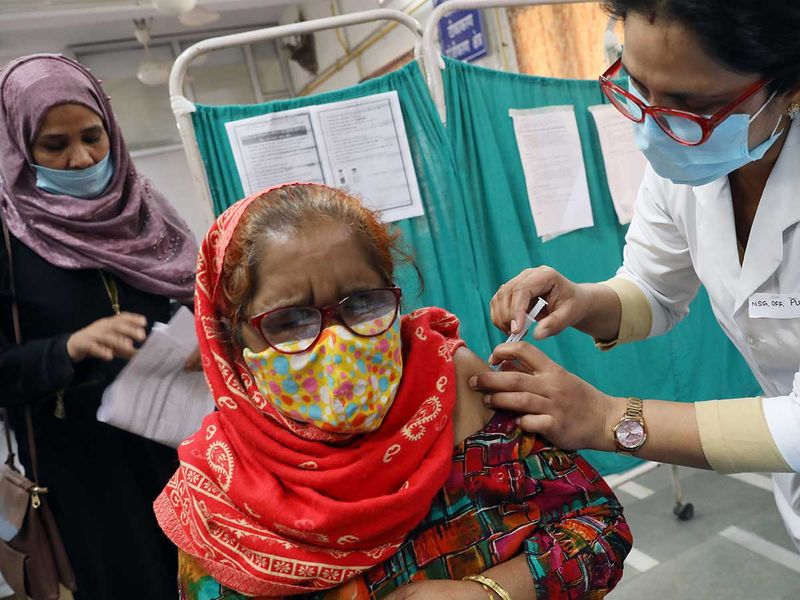
What vaccine development platform was used to produce Covaxin?
It uses the whole-virion, inactivated virus platform.
Who developed the vaccine?
Covaxin was developed by Bharat Biotech in collaboration with Thomas Jefferson University, in Philadelphia, Pennsylvania. According to a Bharat Biotech statement published in Indian media last May, the vaccine was designed in the lab of infectious diseases expert Matthias Schnell at the Jefferson Vaccine Institute in January 2020. The vaccine was also developed in collaboration with the Indian Medical Research Council (ICMR) and the National Institute of Virology (NIV) for COVID-19.
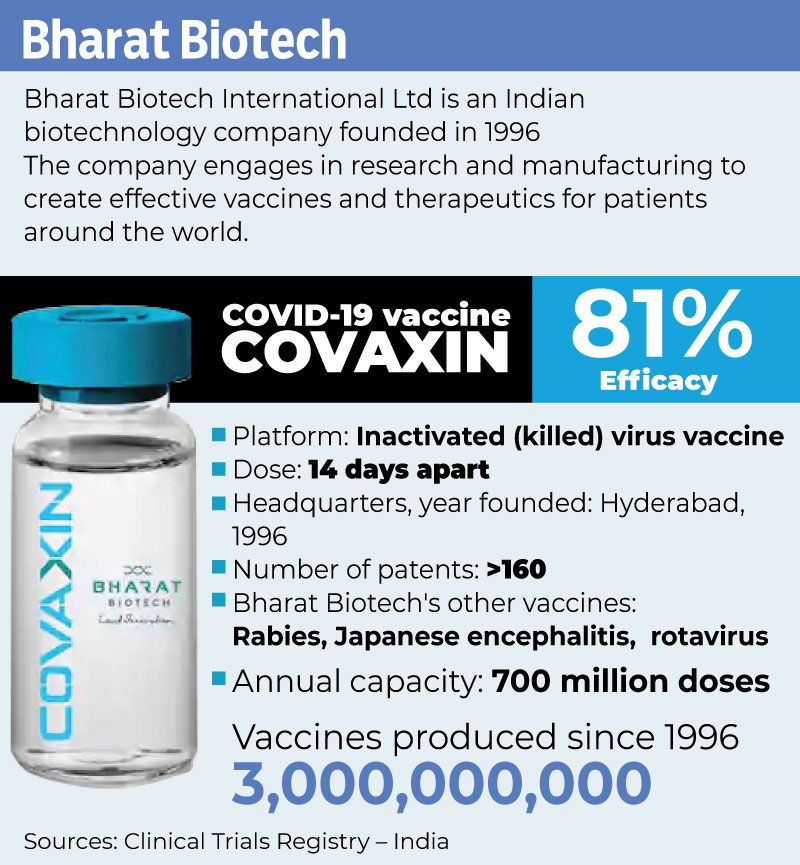
Is the vaccine platform used elsewhere?
It is similar to the COVID-19 vaccine platform used by China’s Sinopharm and SinoVac. In the US, there are at least 11 vaccines (Japanese Encephalitis, DPT, Hepatitis A) using the inactivated virus platform approved for use by the FDA.
What is the price of Covaxin?
On August 4, 2020, Dr Krishna Ella, Bharat Biotech’s managing director, vowed to supply Covaxin to the whole world, at a cost “less than a water bottle.”
How many vaccines does Bharat plan to produce this year?
On January 4, 2021, Bharat Biotech stated the firm is setting up four vaccine manufacturing facilities with a combined capacity of 700 million doses per year.
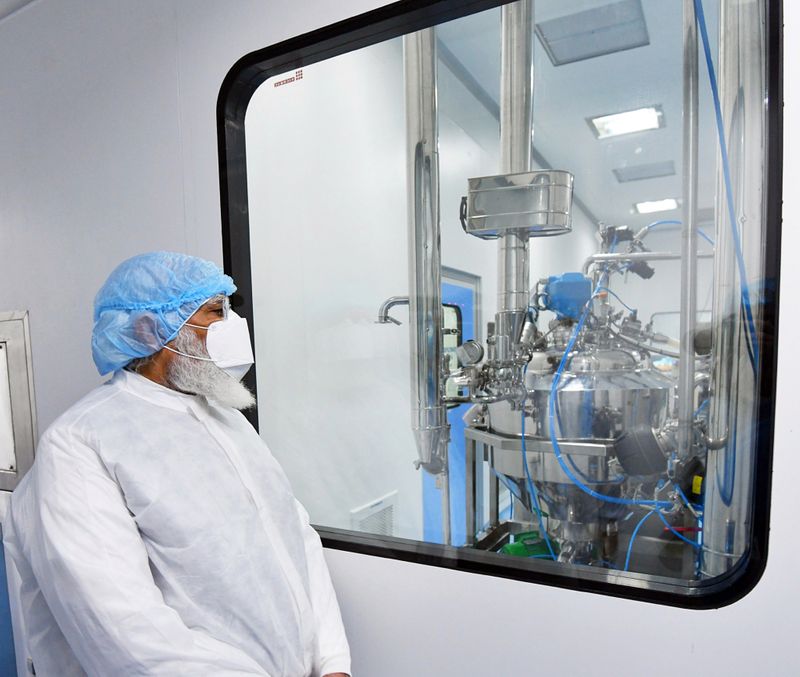
How many employees does the company have?
700 (as of July 2020)
Which countries have ordered or shown interest in Covaxin?
■ Brazil has already placed 20 million orders of Covaxin.
■ 40 other countries, including the US, have shown interest in Covaxin, according Bharat Biotech.
What’s Bharat Biotech?
Bharat Biotech is an Indian biotechnology company launched in 1996 by Dr Krishna M. Ella and his wife, Suchitra Ella. Headquartered in Hyderabad, the capital of the southern Indian state of Telangana, the company produces vaccines, biotherapeutics and healthcare products. Bharat Biotech owns more than global160 patents, according to the company website.
Its product portfolio includes more than 16 vaccines, four biotherapeutics, registrations in 123 countries and pre-qualifications from the World Health Organisation (WHO). The company has so far delivered more than 3 billion doses of various vaccines worldwide.
Who’s Krishna Ella?
Dr Krishna Ella is the chairman and managing director of Bharat Biotech International Limited. A research scientist in molecular biology, he hails from a farming family in Thiruttani at Tamil Nadu and Andhra Pradesh’s border.
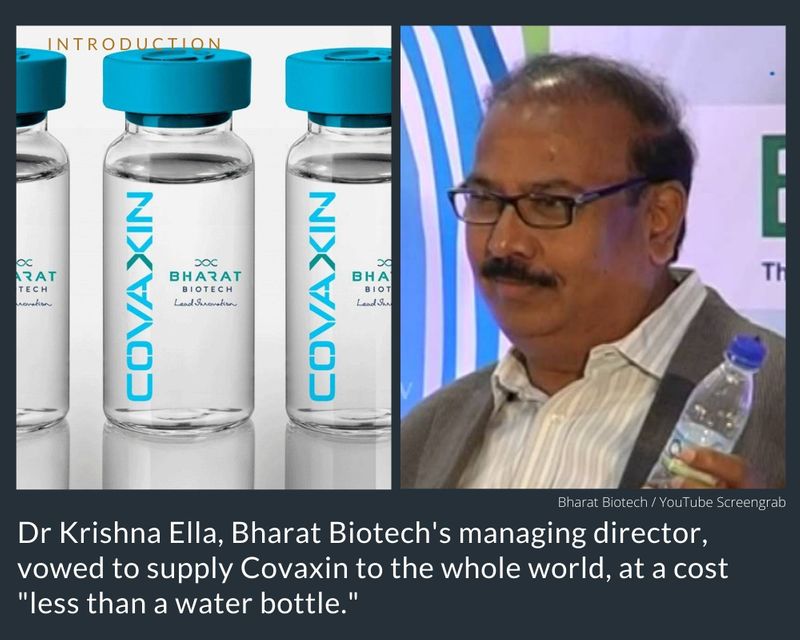
Ella obtained a PhD from the University of Wisconsin-Madison and worked at the Medical University of South Carolina. In 1996, Ella and his wife Suchitra launched Bharat Biotech at Genome Valley in Hyderabad to produce an indigenous hepatitis B vaccine. It diversified its portfolio with vaccines for rabies, polio, Japanese encephalitis, H1N1 influenza, according to the Indian Express. Bharat Biotech grew to become a leading vaccine-maker, with more than 16 vaccines in the market.
Where is the Bharat Biotech production facility?
All vaccines are manufactured at Bharat Biotech’s facility in Genome Valley, Hyderabad, India. Reported to be the largest facility of its kind in Asia-Pacific, it has been certified and attested by several global regulators and WHO.
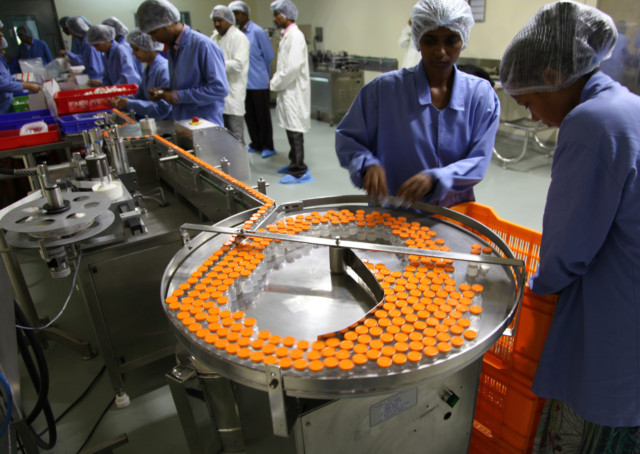
What are the main products of Bharat Biotech?
Bharat Biotech’s main products are vaccines, biotherapeutics and healthcare products. It manufactures vaccines for typhoid, rotavirus, Japanese encephalitis, polio, rabies, therapeutics, and others.
The main vaccines are:
- Rotavac (for rotavirus)
- Typbar-TCV (typhoid)
- Biopolio (polio)
- Comvac 3 (a three-vaccine combo)
- Jenvac (Japanese encephalitis)
- Covaxin (COVID-19)
- BioHib (haemophilus influenza type B)
- Revac-B (hepatitis B)
- Indirab (rabies)
- Comvac 5 (a five-vaccine combination)
- HNVAC (swine flu)
What is the significance of India’s first home-grown vaccine?
▩ Bharat Biotech’s announcement of interim results of Phase 3 trials of Covaxin will help quell the controversy surrounding the COVID-19 vaccine’s emergency use authorisation.
▩ When India's drug regulator cleared its use in “clinical mode”, the action angered the medical fraternity. How can a vaccine be deployed when crucial results are not published? they asked.S o the furore is not without merit. But the attempts to drown out those complaints as anti-national were reprehensible. After all, people’s lives are at stake.
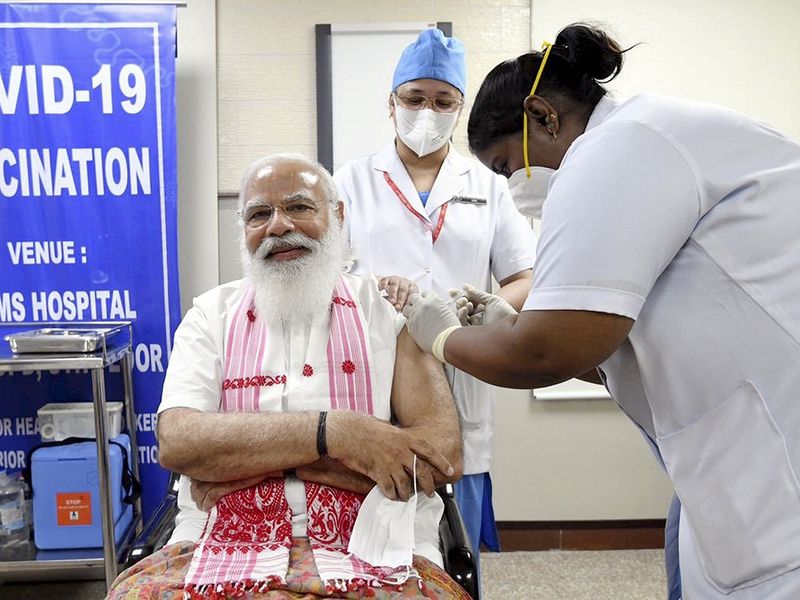
▩ These attempts to discredit the critics actually backfired since the noise only served to amplify the fears over Covaxin. That was sheer injustice to a firm that makes 16 vaccines that are supplied worldwide. They do know something about vaccine safety.
▩ The early results of the vaccine, which was made using an existing deactivated rabies vaccine as a vehicle for coronavirus proteins, were very encouraging. Bharat Biotech joined hands with the Indian Council of Medical Research’s (ICMR) National Institute of Virology to develop the vaccine.
▩ The results sure were delayed, and in the absence of results, Covaxin should not have been cleared for emergency use. The lack of transparency created a vaccine hesitancy that’s not easy to eliminate.
▩ But the Phase 3 interim results should help. What is also worth remembering was that Phase 1 results were published in the medical journal Lancet. The publication and peer review of the Phase 3 results is an absolute necessity to regain public confidence.
▩ In the times of COVID-19, vaccine diplomacy gives vaccine-producing countries enormous leverage. Serum Institute of India’s Covishield is being exported to several countries.
▩ Some countries have evinced interest in Covaxin too. That should bring India precious foreign exchange and plenty of goodwill.
▩ The significance of Covaxin results goes way beyond that. It means India will be able to vaccinate its population faster with the availability of more vaccines.
▩ Inoculating a country of 1.3 billion is not easy. Every dose counts. Removing the cloud over Covaxin was important. Now, more Indians will follow in Prime Minister Narendra Modi’s footsteps, and get the Covaxin jab.
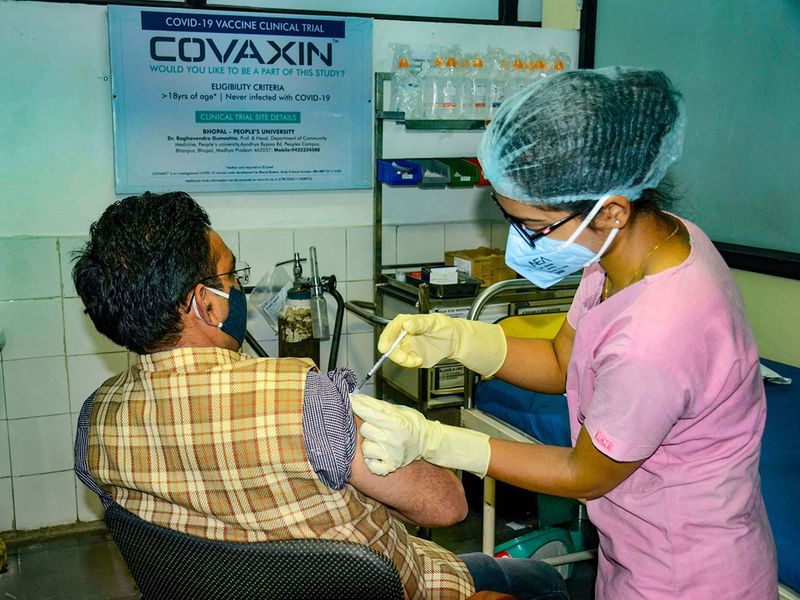
from World,Europe,Asia,India,Pakistan,Philipines,Oceania,Americas,Africa Feed https://ift.tt/2NSMlhn
No comments:
Post a Comment